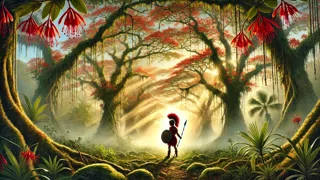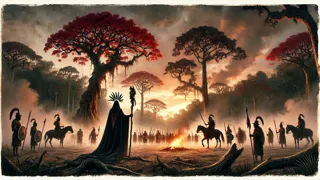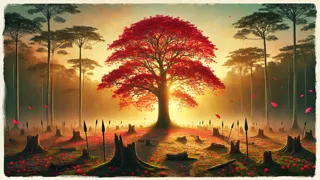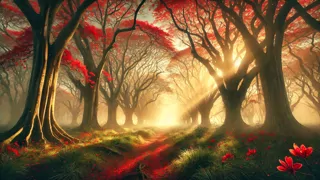Introduction
Long before Argentina’s land was crisscrossed by roads and cities, an ancient forest of Ceibo trees stretched as far as the eye could see. Each tree bore clusters of fiery red blossoms that glowed like embers against an emerald canopy, painting the world in hues of life and hope. Legends passed down by the Guaraní people spoke of spirits dwelling within those blossoms, guardians of the land who maintained the balance between creation and decay. It was said that, in times of dire need, a pure-hearted warrior could call upon the forest’s magic to protect the people—if they were willing to make the ultimate sacrifice. The Ceibo forest was more than a backdrop to daily life; it was the heartbeat of songs, ceremonies, and sacred rites woven into every basket and painted mask. Into this realm of whispered prophecies and living wood stepped a young hero named Amaru, son of the tribe’s chieftain and student of ancient lore. He trained beneath the rustling branches, learning to interpret omens carried by drifting pollen and to honor every river, stone, and petal. Drawn by visions in the velvet depths of night, Amaru stood at the threshold of destiny, unaware that his bravery would become the seed from which Argentina’s national flower would one day bloom. In the hush before dawn, beneath branches heavy with petals, his journey as protector and sacrificial hero began in a world alive with ancient promise. As crimson petals drifted on morning breezes, the stage was set for a legend that would transform loss into hope and blood into blossoms. In the silence, every breath carried the weight of prophecy and the promise of rebirth.
The Whisper of the Forest
In the heart of what would one day be called Argentina, an ancient forest stretched beneath a canopy of vibrant green leaves and blood-red blooms. The trees stood tall and proud, their wide trunks scarred by time yet alive with shimmering sap. Each branch held clusters of fiery blossoms that danced in the breeze like living embers. A perpetual mist weaved through the undergrowth, carrying whispers of secrets long forgotten by mortal ears. The Ceibo trees, revered as guardians of the land, seemed to pulse with an energy that flowed like a hidden river beneath the forest floor. Moss-covered stones marked forgotten pathways leading deeper into shadows where only the bravest dared tread. Legends spoke of mystic spirits who watched over these woods, guiding worthy souls toward destiny. The air was thick with the scent of earth and petals, intoxicating travelers who strayed from well-worn trails. As dawn broke each morning, shafts of golden light illuminated the crimson crowns above, creating a tapestry of color that inspired both awe and reverence. In the hush before sunrise, even the birdsong seemed hushed, as though nature itself paused in reverence.

Beyond the forest’s edge lay a settlement of the Guaraní people, whose lives were intertwined with the rhythm of wind and water. Young Amaru, son of the tribe’s chieftain, trained each morning beneath the towering Ceibo, mastering spear and shield with measured precision. His heart beat in tune with the land, and he felt every shift of light and shadow as if it were an echo of his own spirit. Elders spoke of a prophecy that promised the arrival of a hero born under the first red bloom of the season, a warrior destined to defend the forest’s sacred heart. Amaru had always listened with quiet reverence, though doubt sometimes flickered in his mind like a leaf caught in a storm. He spent hours running through tangled groves, listening for the forest’s voice in the rustle of leaves and the cry of distant birds. Tribal shamans taught him to read the patterns of root and stone, deciphering omens carried by drifting pollen. His mother wove red blossoms into his hair as a sign of blessing, while his father entrusted him with tales of ancient battles fought to protect these lands. Each night, the glow of the Ceibo blossoms drifted into Amaru’s dreams, beckoning him toward an unknown fate. When the wind brushed across his cheek, he felt a whisper: the forest itself was calling.
One humid evening, as the sun dipped low and the canopy blazed with fading light, Amaru knelt beside a mirror-still pool at the forest’s heart. Moonlight danced upon its surface, weaving patterns that spoke of destiny and sacrifice. In that moment, the spirit of Arasy, goddess of the sky, emerged from the pool’s edge, her form shimmering like stardust. Her voice, soft as a breeze over water, echoed through the clearing and called him by name. She warned that a great darkness would consume the land unless one with a pure heart gave life’s final breath to awaken the Ceibo’s magic. “Your blood, brave warrior, will nurture the roots of hope,” she whispered, her eyes burning with ancient fire. Amaru’s chest tightened, for he understood the gravity of her command even as fear coiled in his throat. He reached toward the goddess, his hand trembling with reverence and resolve. As the vision faded and the forest returned to silence, he folded his arms across his chest, feeling the weight of prophecy settle around his shoulders. That night, sleep eluded him as the promise of sacrifice pulsed in every heartbeat.
In the dawn that followed, Amaru gathered his favorite spear and draped a cloak of woven grasses over his shoulders. The air smelled of damp earth, crisp and hopeful beneath an orange sky. Elders pressed protective talismans into his hand and offered prayers to the land spirits as they watched him walk toward the forest’s edge. Every footfall echoed with centuries of ritual, binding him to a duty older than memory. Birds took flight overhead, their cries mingling with the low chant of shamans seeking guidance from the unseen. Amaru paused to rest his palm against the rough bark of a mighty Ceibo tree, thanking it for its strength and asking for its blessing. A single crimson petal drifted to his feet, carried on a sudden gust that seemed to pulse through the earth itself. He tucked it into his hair as a token of hope and pressed onward. Though the path before him led him deep into unknown perils, there was no turning back. His fate, like the forest’s, was now intertwined with the destiny of the Ceibo blossom.
Word of a gathering storm reached the settlement by midday, carried on the worried breath of travelers from distant hills. Amaru felt a shiver run down his spine as he surveyed the sky, where heavy clouds gathered like predators circling their prey. With his spear in hand and resolve forged in fire, he set forth into the forest’s deeper shadows, following a path known only to the ancestors. Each step he took seemed guided by unseen hands, as though the very earth had mapped a course for his feet. Beneath the tall Ceibo trunks, vine and root formed a natural archway through which he passed with quiet determination. The canopy above wavered between light and dark, reflecting the uncertainty of the journey ahead. At the edge of a mist-laden clearing, Amaru paused and knelt to offer a silent prayer of gratitude and courage. He whispered the names of his forebears as the wind carried his words into the hush between the trees. Then, with a steady inhale of forest air and a steady exhale of purpose, he rose, ready to face whatever lay hidden within the emerald depths. The promise of sacrifice and the hope of blossoming life drove him forward beneath the watchful gaze of ancient branches.
The Shadow Over the Camps
Toward twilight, dark tendrils of smoke curled above the neighboring hills, carrying the scent of burning timber and fresh blood. The Guaraní camps stirred in anxiety as elders sounded warning drums that echoed across the clearing. Cries of alarm ricocheted through the huts as mothers gathered children and hunters readied their bows. Amaru, alerted by the steady beat of the drums, raced toward the settlement’s edge, his heart pounding with tension. He reached the crest of a low ridge to find black-robed figures advancing through the dusk like a tide of shadows. Their leader, a sorcerer known in whispered rumors as Ka’i the Cruel, brandished a staff crowned with a severed ceibo blossom, its petals wilting into ash. Flames licked at thatched rooftops as the invaders pressed forward, their eyes gleaming with malice. The forest seemed to recoil at their approach, leaves falling like tears to the earth. Smoke-filtered sunlight cast the clearing into a hellish twilight, and even the bravest felt a chill beneath their skin. Amaru steeled his resolve and shouted a rallying cry that split the air, calling his people to stand fast against the coming storm.

The clash of steel and bark echoed beneath ancient limbs as warriors hurled themselves into battle to defend their homes and kin. Amaru’s spear moved in precise arcs, each thrust and parry guided by instinct honed through years of training. Around him, the Guaraní fought with desperate courage, their voices joining in fierce battle cries that rose above the clash of weapons. Ka’i’s sorceress apprentices weaved dark magic, conjuring creeping vines that snaked along the ground to entangle ankles and hearts alike. Moment by moment, the invaders advanced, pushing the defenders back toward the heart of the camp. Flames crackled through dry brush, sending embers surging skyward like malevolent fireflies. Amaru surveyed the chaos, calculating each movement with the sharp focus of a predator on the hunt. A thundering roar marked the arrival of a massive war beast summoned by Ka’i, its eyes glowing like embers in the gloom. A hush fell as the creature charged, and Amaru leapt forward, shield raised to meet its horned head. The impact sent him sliding across scorched earth, but he rose without hesitation, spear poised and fierce determination shining in his gaze.
As the battle raged, Ka’i himself stepped into view, his cloak swirling with shadow and petals of fallen Ceibo blossoms that wilted at his touch. He raised his staff high and unleashed a wave of dark energy that roared through the clearing like a living storm. The magic twisted the very ground beneath their feet, turning roots into snaring tendrils and splitting stones asunder with bellowing cracks. A sudden silence fell, broken only by the terrified cries of wounded fighters. Amaru felt the forest’s heartbeat grow erratic, as though the sacred land itself suffered a mortal wound. With fierce resolve, he charged toward Ka’i, weaving between blasts of corruption that seared the air with crackling power. His spear hummed with each step, guided by a force older than the wind. He met Ka’i’s staff with a resonating clang that sent sparks dancing into the gloom. The sorcerer sneered and summoned a vortex of petals that shredded armor and spirit in equal measure. Amid the swirling chaos, Amaru remembered the goddess’s words: “Your blood will nurture the roots of hope.”
In that fateful moment, Amaru understood the true test of his destiny: he must commit the ultimate sacrifice to awaken the forest’s ancient power. He tightened his grip and pivoted toward the sacred grove where Ceibo trees formed a natural cathedral of living wood. Each step he took felt weighted by history and destiny, the wind whispering encouragement as he bled onto the mossy floor. Ka’i advanced with malicious glee, casting curses that stole breath and hope in equal measure. Blood dripped from Amaru’s shoulder, hot like living flame, but his eyes shone with unwavering purpose. He sprinted past the sorcerer’s gyre of dark magic and plunged his spear into the earth with every ounce of strength left in his body. A shockwave of red light pulsed from the point of impact, washing over wounded warriors and twisted roots alike. The grove trembled as petals rained down like embers, each one carrying a spark of promise. Ka’i howled in defiance, but the darkness he wielded recoiled as ancient magic surged through every branch and leaf. Amaru fell to his knees, his last breath mingling with a chorus of whispered chants rising from the forest floor.
As Ka’i’s incantation faltered, the sorcerer recoiled in shock, his staff splintering under an unseen force. The dark vines withered, and a hush fell upon the battlefield as though the forest itself held its breath. Amaru, panting and bruised, refused to rise; every muscle in his body trembled with both triumph and exhaustion. He sank to one knee beneath a canopy of wounded limbs and swirling dust, his spear a lifeline against the warming ground. Blood welled from a deep wound at his side, its heat seeping into the thirsty earth below. A soft glow emerged at the base of a nearby Ceibo, a faint pulse that matched his fading heartbeat. Around him, the survivors gasped as spectral petals drifted downward, catching on armor and bare skin like silent messengers. In that fading light, Amaru’s vision blurred as he pressed a final hand to the damp soil. With a whisper of gratitude to the spirits and a trembling sigh, he exhaled into the twilight and gave his life for the promise of new blossoms. His sacrifice, woven into the very fabric of the land, was completed.
Blood of the Hero, Bloom of Hope
At first light, the forest of Ceibo stood transformed, as if a miracle had woven its roots through every trunk and leaf. Soft rays of sunrise filtered through what once had been broken branches, now whole again in nature’s gentle mending. Mist rose from the earth in delicate swirls that drifted among the mournful hush of stunned warriors and survivors. In the center of the clearing, where death had reigned only hours before, fresh shoots unfurled along a single towering trunk. The bark, smooth and new, glowed with an inner luminosity that banished the last shadows of night. Gentle breezes stirred each leaf, sending a cascade of crimson petals raining onto the dewy grass below. Every breath drawn by the onlookers tasted of wonder and renewal, mingled with the faint metallic scent of blood that still clung to the soil. Even the wounded could not help but reach toward the brilliant blossoms, their hands trembling as they sought comfort in new life. Birds, silent witnesses of the previous night’s horrors, began to sing once more, filling the grove with fragile melody. In that moment, sorrow was reborn into hope, carried on every petal drifting through the dawn air.

Chief Illari, Amaru’s father, stepped forward with tears in his eyes and laid down his ceremonial staff at the tree’s base. He whispered a blessing in the old tongue, invoking the spirits that dwelled within every root and branch. The gathered tribesfolk knelt beside him, their voices rising in a soft chant that spoke of sacrifice, courage, and undying love for the land. Among them stood Arasy’s priests, their faces upturned to the canopy now thick with blossoms, offering garlands of fresh flowers in tribute to the fallen hero. No one spoke of defeat that day, for the triumph of life over darkness resonated in every beating heart. Messages of wonder traveled like wind-carried fire beyond the forest, reaching distant valleys and igniting joy among allies and neighbors. Stories of the Ceibo’s miraculous rebirth spread across rivers and plains, uniting communities who had once been strangers in shared marvel. Poets and singers composed new verses in Amaru’s honor, weaving his name into songs that would endure for generations. Even the sorcerer’s dark followers fled in awe, their malevolent purpose extinguished by a power they could neither grasp nor confront. And throughout the land, the red Ceibo blossom became known as a symbol of hope reborn from sacrifice.
In the years that followed, the Ceibo tree stood as the beating heart of the land, its blossoms marking seasons of renewal and remembrance. Pilgrims traveled from every direction to stand beneath its shade, leaving offerings of woven reeds and painted stones at its roots. Children learned to speak of Amaru as both hero and guardian, their stories taught alongside lessons of respect for nature’s rhythms. Every spring, the forest came alive in a glorious display of blooms that carpeted the ground with red petals like a sea of hearts. Travelers carried petals home in bundles, pressing them between pages of books to preserve the legend in silent testament. Scholars recorded the tale in carefully illuminated manuscripts, ensuring that generations to come would never forget the warrior whose sacrifice birthed a nation’s emblem. When drought or hardship struck, villagers would gather beneath the Ceibo’s limbs to seek guidance and strength from the legacy beneath those scarlet crowns. Poets invoked the memory of blood mingled with bark as proof that even in death, life could flourish anew. Through wars and peace, the Ceibo stood unbowed, its roots burrowed deep in the soil of memory and hope. And when twilight fell each evening, flickers of lamplight danced upon its blossoms, a reminder that sacrifice and hope could shine even in the darkest hours.
Centuries passed, and the Guaraní tribe gave way to new settlements and cultures, yet the Ceibo blossom endured as a constant thread through the land’s ever-changing tapestry. Conquistadors and settlers alike paused in their journeys to marvel at its radiant beauty, learning to call it simply “flor de ceibo.” Artists from distant cities sketched its form, capturing every curve of a petal and the intricate pattern of its stamen in meticulous detail. Royal envoys carried seeds to faraway courts, where they bloomed in formal gardens as symbols of courage and unity. In time, young leaders adopted the Ceibo blossom as a banner under which people could gather, offering a reminder that sacrifice had the power to transform even the deepest wounds. Historians traced the myth back to a warrior’s final heartbeat, his spirit said to live in every flower that emerged each season. Across mountains and plains, the Ceibo became more than a blossom; it was a living testament to the resilience of a nation forged by blood, spirit, and unwavering love for the land. Even today, when the wind rustles through Ceibo branches in towns and cities, it carries an echo of Amaru’s vow. In the red glow of each bloom, a story lives on—a story of sacrifice that blossomed into hope, weaving past and present into a single, unbreakable bond. Every time a buoyant breeze lifts a fallen petal, the land remembers the cost that granted it life and the hero whose legacy bloomed eternal.
As generations have come and gone, the Ceibo Flower has been woven into flags, embroidered into garments, and etched into the hearts of a nation that rises from the same soil. Travelers often remark on the striking scarlet of the blooms against the endless sky, feeling a profound connection to the land’s ancient heartbeat. Today, when celebrations mark the arrival of spring, children dance around Ceibo trees, their laughter echoing through plazas where the legend lives on. Sailors returning from distant seas carry petals in their pockets as tokens of home, offering them to loved ones as proof that hope can grow even in exile. Botanists study the tree’s resilience, marveling at how it thrives in both flood and drought, drawing lessons for nurturing life in the harshest conditions. In classrooms and marketplaces, storytellers share details of Amaru’s final stand, reminding listeners that every blossom carries the weight of sacrifice. Even as cities expand and modern life accelerates, Ceibo blossoms continue to appear in the simplest of moments—on café tables, in windowsill vases, and on roadside shrines. They are a living tribute to courage transcending time, a vibrant bridge between past and future. And though the warrior’s blood sleeps beneath the forest floor, his spirit dances with every gust that stirs the red petals overhead. The legend of the Ceibo Flower remains a testament to the belief that from the greatest sacrifice can bloom the deepest hope.
Conclusion
In the rich tapestry of Argentina’s past, few stories resonate as deeply as the legend of the Ceibo Flower. It is more than a myth; it is a living emblem that threads the blood and spirit of a warrior into the soul of a nation. Each blossom carries the echo of Amaru’s sacrifice, a reminder that love for land and kin can transform sorrow into enduring beauty. Through wars, droughts, and shifting empires, the Ceibo Flower has stood as a beacon of hope, its crimson petals a testament to nature’s power to heal and renew. Today, as the national flower, it graces flags, festivals, and everyday moments, inviting each generation to remember the courage that blossomed from sacrifice. When petals scatter on the wind, they carry whispers of an ancient promise—that even in loss, there is the possibility of rebirth. The legend calls us to honor the harmony between people and nature, to cherish the fragile threads that bind us all. In every red bloom, we find a story of sacrifice, unity, and the undying hope that binds a land together. The Ceibo Flower’s petals may fall, but its legacy remains forever rooted in the heart of Argentina. Each year, communities gather beneath lined rows of Ceibo trees to share tales of valor and gratitude, reinforcing the bond between ancestors and descendants. Whether in quiet forests or bustling city plazas, the scarlet blossom endures as a vibrant reminder that sacrifice and love can sow seeds of everlasting hope.



















